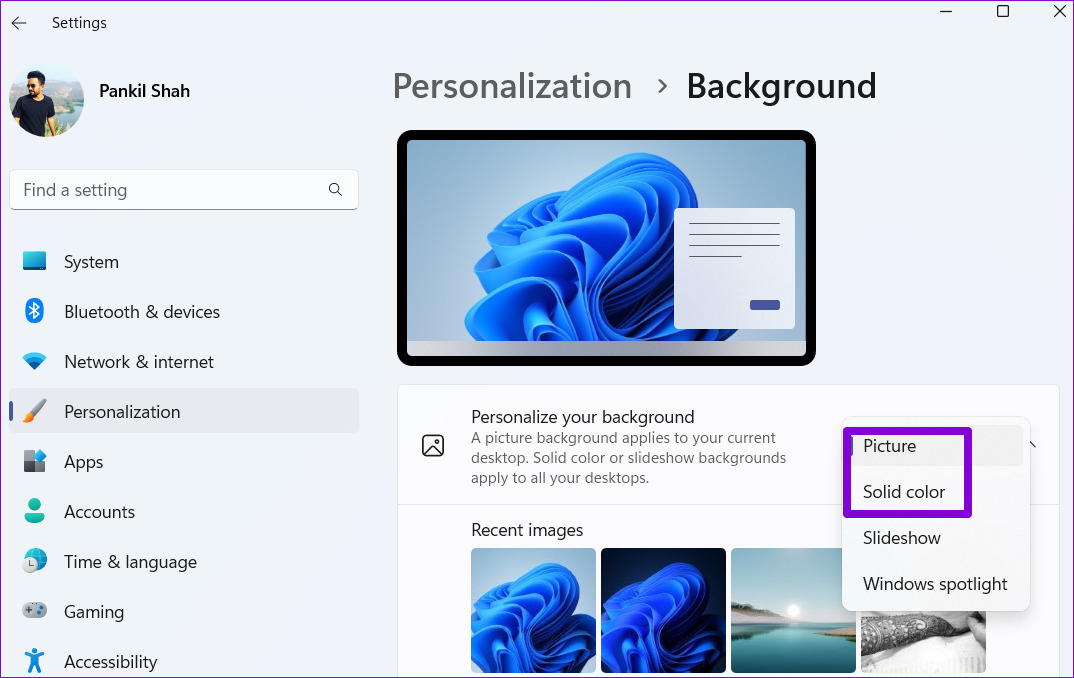Fix 1: Check Desktop Background Settings
Enabling wallpaper slideshow in Windows can cause your desktop background to change at regular intervals. So, it’s a good idea to use a static image as a wallpaper for your computer’s desktop. Here’s how to do that.
Step 1: Press the Windows key + I to open the Settings app and head to Personalization > Background.

Step 2: Click on the drop-down menu next to Personalize your background and select Picture or Solid color.

Fix 2: Prevent Windows From Syncing Settings
Enabling Windows sync allows you to synchronize your settings and preferences across multiple devices. As a result, when you change the desktop background on one device, it affects all linked devices. If you don’t want that to happen, here’s how to stop Windows from syncing your settings.
Step 1: Press the Windows key + I to open the Settings app. Then, go to Accounts > Windows backup.

Step 2: Click on Remember my preferences and clear the checkmark in front of Other Windows settings.

Fix 3: Check Ease of Access Settings
The Ease of Access settings in Windows make it simple for people with disabilities or impairments to use their computers. If you’ve recently altered these settings to improve screen visibility, Windows may change the desktop background automatically. Here’s how to stop that.
Step 1: Click the search icon on the taskbar, type control panel in the box, and press Enter.

Step 2: In the Control Panel window, use the drop-down menu at the top right corner to change the view type to Large icons. Then, click on Ease of Access Center.

Step 3: Click Make the computer easier to see.

Step 4: Scroll down to clear the Remove background images checkbox and hit Apply.

Fix 4: Delete Corrupt Theme Files
The existing theme files on your computer may have become corrupted or inaccessible. If that’s the case, you must get rid of the damaged theme files.
Step 1: Press the Windows key + R to open the Run dialog box. Copy and paste the following path in the Open field and press Enter:
%USERPROFILE%\AppData\Roaming\Microsoft\Windows\Themes\
Step 2: When the File Explorer opens, click the View menu at the top and select Show > Hidden items.

Step 3: Press Ctrl + A to select everything within the Themes folder and click the trash icon at the top to delete it.

Fix 5: Use the Registry Editor to Lock Desktop Background Settings
If you use a shared computer, you can stop other users from changing the desktop background by modifying a few registry files. Of course, this is only possible if you have administrative privileges on Windows.
Step 1: Press the Windows key + R to open the Run tool. Type regedit in the box and press Enter.
Step 2: In the Registry Editor window, paste the following path in the address bar at the top and press Enter.
HKEY_CURRENT_USER\Software\Microsoft\Windows\CurrentVersion\Policies

Step 3: Right-click on the Policies key, go to New, and select Key from the sub-menu. Name the key ActiveDesktop.

Step 4: Right-click the ActiveDesktop key, go to New, and select DWORD (32-bit) Value. Name the DWORD NoChangingWallPaper.

Step 5: Double-click the NoChangingWallPaper value and enter 1 in the Value data field. Then, click OK.

Was this helpful?
Last updated on 02 May, 2024
The article above may contain affiliate links which help support Guiding Tech. The content remains unbiased and authentic and will never affect our editorial integrity.










